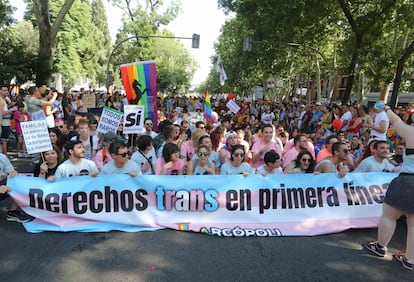Spain’s Equality Ministry drafts law that would let citizens change official gender without medical checks
The proposals from left-wing Unidas Podemos have been met with criticism from some women’s groups and have sparked tensions with their senior partner in the government, the Socialist Party
Spain’s Equality Ministry has prepared a draft bill that would allow transgender people to officially change their gender with the Spanish authorities and on their ID document, known in Spain as the DNI, without a medical diagnosis of gender dysphoria. Under the planned legislation, titled the “law for real and effective equality for trans people,” an individual aged 16 or over would be able to change their name and gender in the civil registry with a sworn statement – no medical check would be required. Sixteen is also the minimum age from which a person can make decisions about hormone treatments.
The text of the draft bill also recognizes non-binary people – who identify as neither male nor female – and proposes eliminating the gender field on their official documents. It would also open access to assisted-reproductive treatment to “trans people who are able to reproduce.”
The PSOE believes the right to gender self-identification could introduce “ambitious and legally insecure concepts” that change the understanding of sex, gender, identity and equality
The legislation was part of a governing agreement signed between the Socialist Party (PSOE) and Unidas Podemos after the inconclusive results of the 2019 general election, and which saw the parties create a coalition government. The Equality Ministry, led by Irene Montero of Unidas Podemos, met with more than 20 different LGBTQ+ and trans collectives to finalize the future law, which is based on an initiative Unidas Podemos presented in 2017. Sources close to Montero say they expect to bring the bill to the Spanish Cabinet in the first half of February.
But the draft law has been met with opposition from some women’s groups and has also sparked tensions within the coalition government. Last summer, the PSOE criticized the right to “gender self-identification” in an internal document that was made public by members of the party. The document – which was not a formal party resolution – said that the concept of gender was “being used by certain movements to substitute the very concept of sex.” It warned that recognizing the right to self-identify could introduce “ambitious and legally insecure concepts” that change the understanding of sex, gender, identity and equality.
These are the same concerns raised by feminist organizations, such as Against the Elimination of Women, which represents around 100 women’s organizations, and Feminist Convergence Movement, which represents 40. Both groups believe that the distinction between sex and gender must be preserved, arguing that gender self-identification “eliminates” the experience of women. Sources from the government say the draft bill has still a long way to go before it appears before Cabinet.
Here are the main points of the draft law, to which EL PAÍS has had access.
Right to gender self-expression. Spain has allowed an individual to change their name and gender on their DNI without gender reassignment surgery since 2007. But in order to change their gender, a person must provide evidence of a medical diagnosis of gender dysphoria – the discomfort people can feel if their gender identity does not match their body. This is not required under the draft bill for individuals over the age of 16, nor does a person need to undergo any type of medical or surgical procedure.
Hormone treatment and minors. In the case of minors, the bill considers allowing hormone blockers “at the onset of puberty” to help suppress the development of breasts and facial hair, followed by cross-sex hormone therapy – testosterone for trans men and estrogen for trans women. The age of consent for hormone treatment is set at 16. Currently, a minor can take hormone blockers when they reach puberty, but often the process takes a long time and the rules vary depending on regional regulation. Minors under the age of 18 also must have parental consent.

Legal defender. The bill gives individuals from the age of 16 the final word on what their gender and name are on their DNI. Minors between the ages of 12 and 16 who want to make a change at the Civil Registry must do so via their legal representative, who is usually a family member. If this family member does not agree with the decision, a “legal defender” will be named for the minor.
Prospective rights. The text allows a person “to exercise all the rights inherent to their new condition” as a man or woman, but it does not allow these rights to be given retrospectively. The bill outlines that “it will not change the ownership of rights and legal obligations that could correspond to a person before their registry change was inscribed,” making specific mention of the gender-violence law.
Recognition of non-binary people. The text allows an individual for the first time to request that their official documents omit any mention of gender. According to the draft, this is “aimed at satisfying the demands of the part of the population who don’t identify as either male or female.”
Assisted reproductive treatment. Under the bill, trans people “with the ability to reproduce” will have access to assisted reproductive technologies. It also contemplates allowing people undergoing hormone treatment to freeze their eggs and reproductive cells.
Sports. For sporting exercises, events and competitions, trans people will be able to participate “according to their registered gender,” under the draft. “Sex verification” tests will also be banned.
Prisons. The bill gives trans people the right to “be treated and separated according to their registered gender” should they be incarcerated, unless they believe this will endanger their safety.
Education. The bill “guarantees” the right of trans students to express their gender identity. A student’s “physical image, choice of clothing and access and use of facilities of an education center according to their gender identity must be respected,” the document states.
Foreigners. The draft law also gives foreign residents in Spain the right to gender self-identification, “regardless of their administrative situation.”
Work. Trans people can face many difficulties when searching for work. To address this problem, the bill establishes incentives for workplaces that hire “unemployed trans people, with special difficulties in joining the workforce.”
English version by Melissa Kitson.
Tu suscripción se está usando en otro dispositivo
¿Quieres añadir otro usuario a tu suscripción?
Si continúas leyendo en este dispositivo, no se podrá leer en el otro.
FlechaTu suscripción se está usando en otro dispositivo y solo puedes acceder a EL PAÍS desde un dispositivo a la vez.
Si quieres compartir tu cuenta, cambia tu suscripción a la modalidad Premium, así podrás añadir otro usuario. Cada uno accederá con su propia cuenta de email, lo que os permitirá personalizar vuestra experiencia en EL PAÍS.
¿Tienes una suscripción de empresa? Accede aquí para contratar más cuentas.
En el caso de no saber quién está usando tu cuenta, te recomendamos cambiar tu contraseña aquí.
Si decides continuar compartiendo tu cuenta, este mensaje se mostrará en tu dispositivo y en el de la otra persona que está usando tu cuenta de forma indefinida, afectando a tu experiencia de lectura. Puedes consultar aquí los términos y condiciones de la suscripción digital.









































